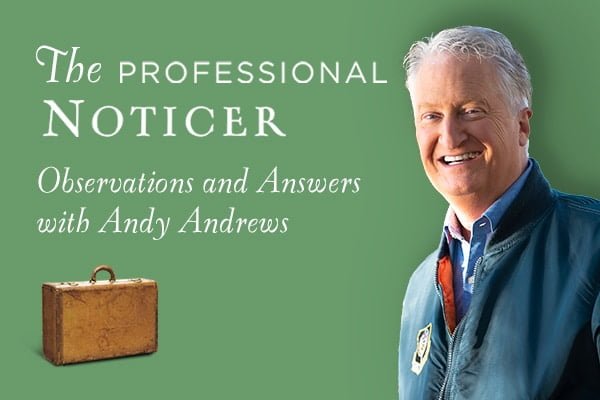It was at least 25 years ago.
A friend was listening to me talk through what I’m sure he had already designated in his mind as “another one of Andy’s crazy ideas.”
And he may have been right! To be honest, I can’t recall what the idea was about. But at some point in my rambling I mentioned that this idea might one day allow me to afford a fishing boat.

“Yeah, well…” he said, “I can’t even think about a boat like that, because I know—with the way I am and what I do for a living—I’ll never have the money for it.”
I’ve thought about that conversation for years. My buddy had a college degree, a good job, and an important title. But, in his mind, those things would never provide him the money necessary to purchase a boat. He was so sure of this that he couldn’t even bring himself to think about the idea of having one.
He was, of course, right. He has never been able to afford a boat.
But in a much larger sense, my friend was TRAGICALLY WRONG. He was wrong about his value. He was wrong about his possibilities. Which means: He was wrong about a large part of his life. Is it dangerous to be wrong about these things? Read on… You decide.
Wise readers have already noted that my friend’s thinking was about much more than just money. While he may have believed the amount on his paycheck was preventing him from buying a boat, the true source of what limited him was something else entirely: his thinking.
HOPE (and the lack of it) IS A THOUGHT PROCESS.
Unfortunately, this type of thinking doesn’t begin or end with just things we can buy. A fixed, non-growth mindset can impact all areas of our lives, leading us to think things like:
- This is just the way I am. (How many times have we said this after exhibiting behavior that we know is unacceptable?)
- I’ll never be _______. (Confident, successful, loved, etc.)
- I need to be satisfied with where I am.
All of these thoughts stem from a place of hopelessness, which means we have two options:
- We can choose to live our lives as they are and maintain the status quo.
- We can choose to live our lives with hope.
Number two is the obvious choice. The difficult part? Determining exactly what it is we’re really hoping for in order to make THAT a chosen, top-brain, conscious part of our every day thinking.
The One Thing We’re All Really Hoping For
If you chose to start hoping for a better job, the truth is that you wouldn’t actually be hoping for a better job.
Whenever we hope for something, what we’re really hoping for is control. We’re hoping for a greater life that we can actually control.
 And that’s where my friend’s hopelessness really came from. It wasn’t his job…it was the way he thought about his job.
And that’s where my friend’s hopelessness really came from. It wasn’t his job…it was the way he thought about his job.
He believed, regardless of his performance, ideas, and choices, he would never be able to move beyond his current position. He had talked himself into believing that he would never actually have control.
Most people allow themselves to hope. But only a precious few realize they are actually in control of the choices that can lead them to a place where those hopes become reality.
I have a name for these precious few.
I call them entrepreneurs.
You Don’t Need to Be an Entrepreneur to Think Like An Entrepreneur!
Every successful entrepreneur I’ve ever known has possessed an overwhelming sense of hope and a conviction that they control their own destiny.
Curiously, however, I also know plenty of people who possess these same qualities but do not own their own business.
Some of them are teachers. A few work for businesses right here in Orange Beach, Alabama. Some—due to brilliant leadership—even work at our local Publix.
While they are not entrepreneurs in the “traditional” sense of the word, they have learned to think like entrepreneurs.
What does it mean to think like an entrepreneur? People have filled entire books attempting to answer that question, but I believe, at its core, thinking like an entrepreneur boils down to consistently asking one question:
Why?
Most of us have been conditioned to only ask “why” when things are going wrong. And as soon as we figure out the answer, we stop asking.
Effective entrepreneurial thinking, however, starts with asking “why” when things are going great:
- Why is this working the way it does?
- Why was that a success?
- Why were my results so much better this time than last time?
Asking why allows us to harness the full power of principles. You can know a principle. You can understand it and identify when the principle is at work. But knowing WHY it works as it does is what allows you the ability to harness that principle and apply it in areas of your life that—at first glance—appear to have no connection to what the principle was used for in the first place!!
The cashier who decides to ask why customers seem to prefer his particular checkout line will be able to leverage the answer to help other cashiers. If management is “on the ball” (and at the Publix in Orange Beach, Bennie Dalzell is one of the best I’ve ever seen) this wisdom will translate into even greater results for the entire company. And when it’s time to promote somebody, there will be a much greater chance that the cashier who started the ball rolling will be the first employee promoted.
The cashier’s thinking—over which he or she has full control—lead to positive results.
All because the cashier harnessed the power of entrepreneurial thinking.
This Is Only the Beginning
“WHY” is the foundation of entrepreneurial thinking, but it is only one of many lessons we can all learn from studying entrepreneurs.
That’s why I’ll be back next week with seven more lessons that will help you create more hope and control in your life.
For now though, tell me…what do you need to ask “WHY” about? Leave a comment below, and let me know!





